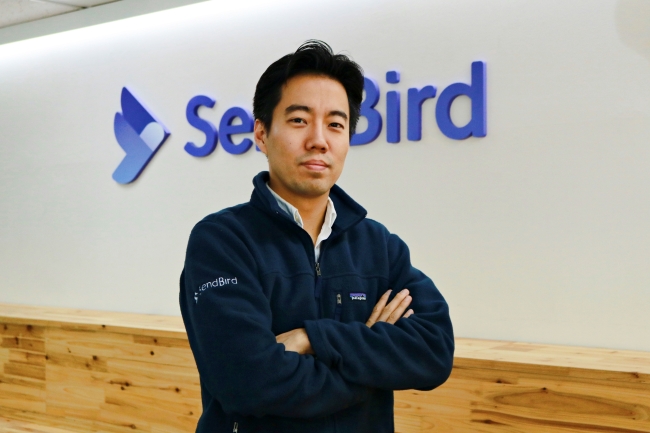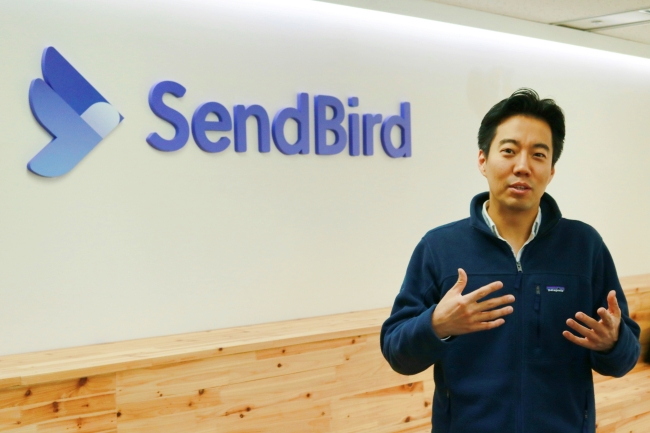Real-time in-app digital messaging is increasingly becoming the norm.
On-demand mobility app users can exchange text messages with drivers to get a ride to deliver food. While watching live-streamed videos of a sports game, you can also send cheers or share thoughts about an athlete or a team. Couples, meanwhile, can enjoy private conversations on dating apps. Those buying a product online can place an inquiry directly to sellers on an e-commerce platforms, while sellers can interact with thousands of buyers.
One player standing out in this bustling market is South Korean-American startup SendBird, a global leader in fully customizable messenger APIs.
 |
SendBird co-founder and CEO John S. Kim (Son Ji-hyoung / The Korea Herald) |
“A handful of messenger platform operators have long monopolized the technology for digital communication,” said John S. Kim, co-founder and chief executive of SendBird, in a recent interview with The Korea Herald at its Seoul office. “SendBird is here to spread the messenger technology to corporates and allow them to embed what is on par with that of conventional messenger apps.”
As the mobile app development gets more sophisticated and requires a multifaceted approach, software developers are increasingly putting together technologies from outside for app improvement, just like “Fordism” gave birth to outside auto part maker giants, according to Kim.
“Traditionally speaking, software developers had to work on tasks at every level of the technical layer to create a mobile app,” he said. “But as software development is becoming more complex, companies that provide parts of the app function like a messenger are growing bigger.”
SendBird’s software development kits and API -- front and back-end technology -- enables corporate clients to take possession of user databases and data related to user experience that once exclusively belonged to messenger app operators, according to Kim.
At the same time, open messenger APIs can empower entrepreneurs, along with customers who will unwittingly enjoy an enhanced user experience.
“End-users won’t know what’s up, since it’s up to our corporate clients to decide how to harness our messenger API tools,” explained the founder. “They may use it to leverage and encrypt internal communications, allow digital communication between online community users or between sellers and buyers.”
The software developer-turned-serial entrepreneur launched the messenger API business in January 2016.
Founded in 2013, the company in its nascent stage was called Smile Family and dedicated to building online communities exclusively for stay-at-home moms. It was Kim’s second startup following Paprika Lab, devoted to social gaming and acquired by Japanese gaming firm GREE in 2012.
Smile Family pivoted the business in May 2015 and changed the company name to capitalize on what was initially designed to facilitate the online conversation between community members. So to say, it began selling the messenger API product.
Starting with a score of corporate clients in Korea, SendBird reached out to partners in the US and abroad, primarily spurred by seed accelerator Y Combinator as participant in its “Winter 2016” batch.
 |
SendBird co-founder and CEO John S. Kim (Son Ji-hyoung / The Korea Herald) |
Now headquartered in San Mateo, California, with offices in Singapore, India, the United Kingdom and Korea, SendBird is looking to diversify the client base, in addition to those ranging from NBA to Yahoo! Sports, GO-JEK, Carousell, Virgin Mobile UAE, SEGA, Wargaming, Glu Mobile, Healthline, TriNet, Accolade, Yell, Hinge, KB Kookmin Bank, LG Uplus and SSG.
As of 2018, its revenue jumped threefold on-year, with some 30 percent of income from the US and 40 percent from Southeast Asian countries, according to Kim.
The growing smartphone penetration across the world heralds more opportunities for SendBird, Kim said.
For example in Indonesia, a majority of people have just begun “entering the world of the internet through mobile phones and learning to make online purchases,” Kim said. Also, those who studied abroad are returning to their home country to venture into mobile technology innovation that “creates something out of nothing,” while investments are pouring into those growth engines, he added.
In February, SendBird received a new round of $52 million investment from investors led by ICONIQ Capital. Kim said he plans to double the firm’s headcount across the world, which currently stands at some 80, for rapid product innovation. He seeks to recruit talented engineers or web designers with an understanding of simple product designs.
By Son Ji-hyoung
(
consnow@heraldcorp.com)







![[Exclusive] Hyundai Mobis eyes closer ties with BYD](http://res.heraldm.com/phpwas/restmb_idxmake.php?idx=644&simg=/content/image/2024/11/25/20241125050044_0.jpg)
![[Herald Review] 'Gangnam B-Side' combines social realism with masterful suspense, performance](http://res.heraldm.com/phpwas/restmb_idxmake.php?idx=644&simg=/content/image/2024/11/25/20241125050072_0.jpg)
